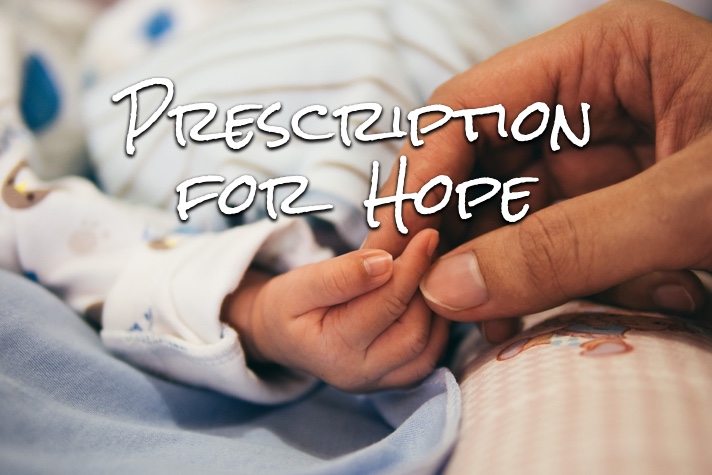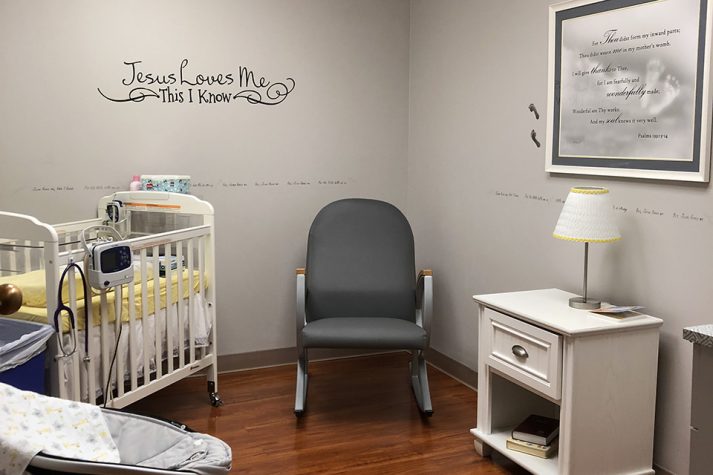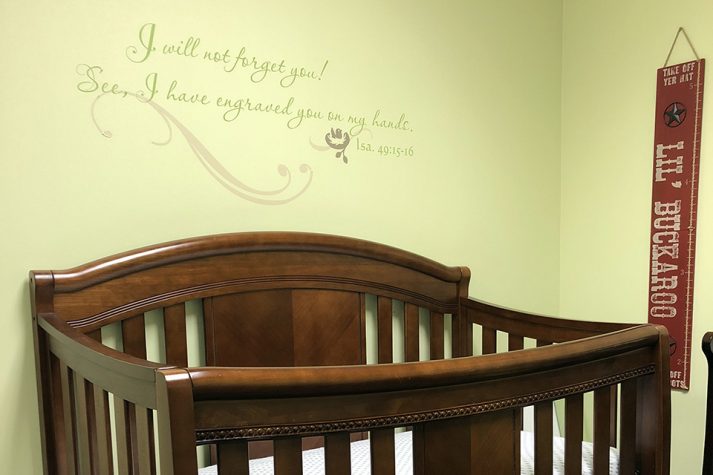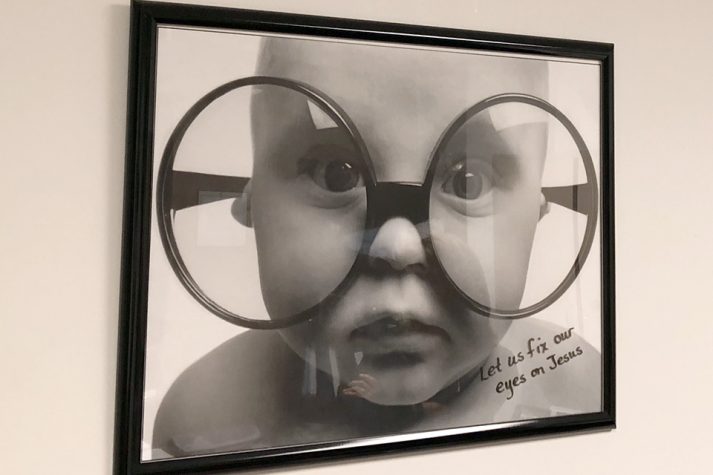
The consequences of the opioid epidemic touch every segment of the United States population, including its newest, tiniest members. Babies born affected by opioids suffer from what’s called neonatal abstinence syndrome (NAS), which is heartbreakingly prevalent in West Virginia and believed to be on the rise nationwide. Lily’s Place, a nonprofit organization created by three women, opened its doors in Huntington in 2014 and has admitted more than 200 babies during that time.
The baby, no more than a year old, peers intently through massively oversized, dark-rimmed eyeglasses in the black-and-white picture hanging in Rhonda Edmunds’ office at Lily’s Place.
He’s zeroed in on something we can’t see. But at Lily’s Place, America’s first Neonatal Abstinence Center, the director of nursing is kindly transparent about her focus. She’s penned a reminder neatly in the lower right corner:
“Let us fix our eyes on Jesus.”
Faith in God is ground zero for this West Virginian nonprofit organization that started housing newborns exposed to drugs in 2014. That’s one year after the state saw a 25 percent jump in the number of babies being born with neonatal abstinence syndrome (NAS), that is, exposure in-utero to opioid-related drugs.
The opioid crisis, which experts estimate claims 115 lives daily, hasn’t ignored the tiniest members of our population. The number of babies born exposed to opioids rose 400 percent from 2000-2012, with a NAS-affected baby being born every 25 minutes in 2012. Affected babies generally display symptoms within 24-48 hours of birth.
Daunting statistics for overall exposure in the population have continued to rise, too. In 2016, the Centers for Disease Control and Prevention reported that West Virginia recorded the most fatal opioid-related overdoses nationwide (52 per 100,000 people).
What is NAS?
NAS stands for neonatal abstinence syndrome. The Centers for Disease Control and Prevention defines it as a “postnatal drug withdrawal syndrome that occurs primarily among opioid-exposed infants shortly after birth.” Their symptoms can vary but typically include central nervous system irritability (they cry inconsolably and shake uncontrollably at times); they struggle to latch onto their pacifier, and they suffer upset stomachs and nausea.
The withdrawal process is hard to watch and costly. The CDC reported that a baby born without complications in 2012 spent on average 2.1 days in the hospital at a cost of about $3,500. A baby born exposed to drugs stayed on average 16.9 days for $66,700.
Caitlin, a new mother from nearby Putnam County, was close to becoming a statistic herself. She can’t remember exactly how many times she overdosed—maybe two or three—but there are two things she can tell you with absolute clarity.
God saved her. And life isn’t about her now.
‘This Is Not the Life I’m Living’
That switch didn’t flip immediately for Caitlin when she found out she was pregnant, although she did start attending church every Sunday. She used meth and heroin here and there early in her pregnancy. Then she found her baby’s father unconscious from an overdose. She performed CPR until the authorities arrived to revive him with naloxone, a nasal spray that can reverse an opioid overdose.
She left him. And got clean. While many people in her shoes might have attended rehab, Caitlin took the nontraditional route of attending church and clinging to her renewed faith in Jesus Christ.
“This is not the life I’m living for my kid,” Caitlin remembered deciding. “What would have happened if she was 2 or 3 and went to check on her dad and he was dead? It was traumatizing.
“I refuse to ever put her through that because ultimately I’m the only one that can prevent that from happening.”

Caitlin’s resolve is further bolstered by her own mother’s example. Caitlin’s grandmother Deborah, who she calls Mawmaw, raised Caitlin and her siblings after her mother made drugs her priority.
Over time, Caitlin thought that maybe drugs were the trick to winning her mom’s heart. She first tried methamphetamine and heroin with her mom.
“That sounds so messed up, but really that’s how I felt,” Caitlin said. “It’s like now I can understand her, and she can understand me because we have this thing in common. It’s destroying both of our lives, but now we have some common ground. I just wanted her to love me.”
Deborah’s small church—the same one Caitlin attends with her today—rallied to raise the funds to send her granddaughter to rehab in Florida, and Caitlin wanted to get clean. But she fell back in with the wrong crowd soon after coming back to her small town in West Virginia and spiraled once more. The worst, she says, was getting high when she knew she was pregnant.
“I don’t want to say that you don’t choose to be a drug addict while you’re pregnant because you do, but it’s not a good feeling that comes with it,” Caitlin said. “Even though I knew, ‘Hey I probably should not stick this needle in my arm now that I’m pregnant,’ I still chose to do that. Even though I knew that was wrong, and now that she’s here, I’ve had to see her journey through all that. It’s like why would I ever choose that again?
“Because I know the minute I pick up a drug, I’m choosing that drug over my child, and I refuse to ever do that again.”
‘How Could You Do That?’
It was scary when Caitlin’s daughter Ellisyn was born, Deborah said. And watching all those little babies suffer through the detox process at Cabell Huntington Hospital was heartbreaking. Deborah just couldn’t understand how her once drug-addicted granddaughter could be so selfish.
“Just walking in and seeing Ellie for the first time, thinking ‘How could you do that? How?,’” Deborah said while rocking a swaddled Ellie sporting a big bow. “But as time went on and we see that, and I’ve told them at church, it’s by the grace of God this child, she’s had very little symptoms of anything.”
Ellie spent two-and-a-half weeks in Cabell’s Neonatal Therapeutic Unit (NTU), which was created after so many drug-exposed babies were taking beds away from true Neonatal Intensive Care (NICU) patients (premature births and those requiring surgery). The NTU has doubled in size to 18 beds since its inception, and it’s in there the babies experiencing the apparent pain of withdrawal receive medication to help with their symptoms.
Edmunds, the director of nursing at Lily’s Place, worked in Cabell’s NICU for 27 years. During that time, she noticed an increase in the admission of drug-affected babies and began researching techniques the staff could use for comforting their tiny patients. The continual rise in drug-affected babies ultimately led Edmunds and two other women to envision Lily’s Place. They wanted a warm and loving environment where babies could come after leaving the hospital to wean off their medication—a place where mothers wanting recovery would have support. Since 2014, the facility has admitted more than 200 babies.
But the staff isn’t just relying on the latest research, scientific advances or even newest technology. Every day, the nonprofit employees voluntarily gather as a group to pray. They talk with God about each patient there, their families, and also share any concerns or praises they have. Ellie, who spent almost a month there, was one such patient who received prayer alongside her family.
Edmunds, citing Proverbs 3:5-6, says she’s constantly trying to lean on the Lord and not her own understanding, and in doing so, she makes a conscious effort to pray over every baby during his or her stay at Lily’s Place.
“I know that our staff prays for them, too, but I want every baby to be prayed for hands on,” Edmunds said. “We pray for them in the morning by names, but I want to hold them and pray for them because I don’t know if they’re ever going to be prayed for again.”
She pauses to collect herself.
“I want to, by name, bring them to the Father. I think everybody deserves that. You have to think, without Him, it’s hopeless.”
‘Satan Is Robbing Her’
Down the hall from Edmunds’ office a tiny baby cries out. She’s hungry and weaning off her detox medication. Babies admitted to Lily’s Place are detoxing with the help of medicine, sometimes methadone, a prescription opioid given in smaller and smaller doses. Her mother isn’t in the room, but that’s not unusual because currently the facility is only set up to house the babies as patients; the same way many hospitals run their NICUs. Moms who don’t live close by can call to check in or they can stop by during visiting hours. Caitlin admitted she called almost every 20 minutes on the days she couldn’t make the 40-minute trip to Huntington. A goal for the facility is to create mother-baby units for mothers who are in recovery.
“That is one of the most difficult things, to see this mother who loves her baby and yet she can’t stop using,” Edmunds said. “I can think of one girl and it was like her third or fourth baby, and she was again losing custody of this baby because she was still in active addiction. She would sit at that baby’s bedside and just look at her. I thought how terrible that she’s feeling what she’s feeling. Just seeing her holding [her baby], it was heartbreaking.
“And to think what Satan is robbing her of.”
Angela Davis, the social worker for Lily’s Place, works directly with the mothers of the newborns. She’s been there since the beginning, and she’s heard many, many tragic stories of the mothers, many of whom just appear selfish to the outside world for choosing to get high rather than nurture their unborn children.
It’s easy to boil it down to a choice, but Davis notes the decision is typically rooted in an unthinkable trauma. Take the new mom whose own mother pulled her from school at age 9 so she could prostitute the streets. Or the young lady, covered in the scars of cigarette burns, whose own parents broke her hip and left it that way. And then there are women like Caitlin who began their drug use with a loved one. Her mother helped her shoot up.
Some of these moms struggle with getting clean, Davis said, because then they have to deal with whatever horror they were trying to shut off. Still, Davis urges and prays them all toward sobriety, trying to ensure the best possible outcome for both mother and child.
“I’ve cried for more of them. I worry about all of them,” Davis said tearfully. “We saw one the other day and I hugged her, kissed her and gave her my cellphone number. I said, ‘Please call me.’ She may never, but I pray she does.”
“They are lost and broken and they don’t know where to turn, and a lot of times the families they come from aren’t great support systems,” shared Alicia Christian, a peer recovery coach for Lily’s Place and program director for The Ark, a faith-based, sober-living facility for women in Huntington. “Unfortunately that’s the truth.
“Their parents are still using so they don’t have anywhere. The people they’re supposed to be able to go to for advice and guidance, they’re just as, if not more, messed up than we are.”

Davis, 19 years in recovery herself, likes to say you’ve got to love them through it, while Christian’s favorite saying is we want to love you to life. But no matter how you phrase it, just showing these mothers nonjudgmental love can make all the difference. One mother, like so many Davis worked with along the way, still reaches out. She calls Davis mama.
“The first time I met her, I told her, ‘I love you.’ She asked, ‘Why?’ I said ‘Because you’re one of mine.’” And she said, ‘I don’t believe that,’” Davis said. “I said, ‘You’ll see.’”
When the young lady’s baby was discharged from Lily’s Place, the sober young woman, ready to be a mother, hugged Davis and said, “I love you.”
“Why?” Davis gently pressed.
“Because you loved me first.”
‘I Would Fight for Her’
Relapse isn’t uncommon, but Caitlin tries to keep distance from bad influences in her one stoplight town. She faithfully attends that same little church that continuously supports her. She doesn’t respond to Facebook messages from the wrong people. And she clings tightly to those friends who anchor her faith and resolve, like a Jesus-loving childhood friend also raised by her grandmother. She hasn’t forgotten about the support she receives from Lily’s Place.
Every day she tells her newborn daughter two things: Jesus loves you. I love you.
How to pray for the mothers:
“That they realize that God can truly help them become the mother they should be with their babies. He is the one that can heal them from this. He is the Almighty Healer.” —Angela Davis, social worker
“Pray for whatever it takes. … At the end of the day, whatever it takes for these girls for the veil to be lifted over their eyes and for them to find God.” —Alicia Christian, peer recovery coach
“I’m proud of Caitlin for what she’s done, but there’s probably always going to be a little bit of doubt in me because she doesn’t talk to me about stuff like that,” Deborah said. “She knows I don’t agree with it. But I think she’ll do fine.
“She knows if she screws up, this little baby, she won’t have this little child because I would fight for her.”
Just like she once fought for Caitlin. That reminder prompts Caitlin to wipe her eyes.
“I’m eternally grateful for her,” Caitlin said, nodding in her Mawmaw’s direction. “I could never repay her for what she’s done for me. She’s the best thing that’s ever happened to [me and my siblings] for sure.
“She’s the rock that holds us all together. I don’t think she realizes that sometimes.”
But as far as Caitlin is concerned, the generation of drug use ends with her. She fearfully wonders sometimes how her poor decisions will affect Ellie’s future, but she trusts God will handle that. She’s also steadfast when it comes to her relationship with her mother, who has popped back into the picture again.
“Sorry, it’s not about me anymore,” Caitlin said. “It’s not about you just affecting my life. You’re impacting hers as well, and I’m the only one who has control over the type of people in her life. I’m her advocate. I’m not going to put her in the position where she could end up, she could be put in the same position as me.”
“I think that looking at Ellie, I refuse for her to ever feel that way, and my way doesn’t work,” Caitlin said. “The cycle’s got to end somewhere.”
Trust God with your tomorrow. Find peace with Him today.
This article is the third in an ongoing series about the opioid crisis. Read the first two installments: The Opioid Epidemic Is ‘Every Single Christian’s Problem’ and ‘She Belongs to Jesus’: Fighting for Loved Ones Overcome by Opioid Addiction’.


